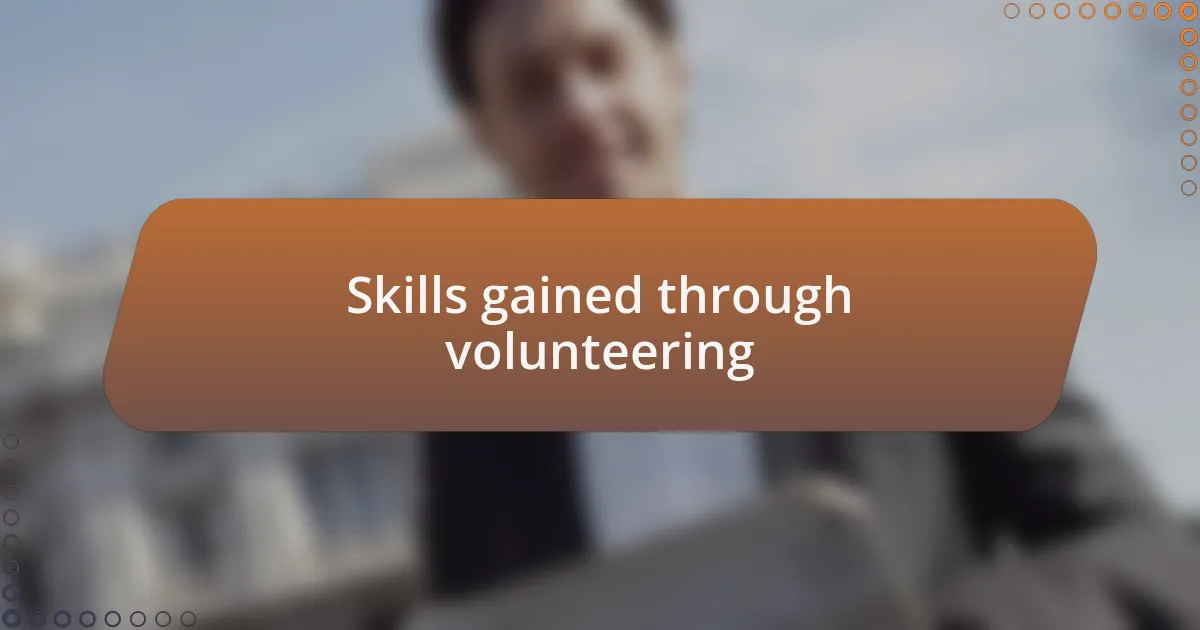Key takeaways:
- Sports volunteering fosters community connection, personal growth, and a sense of belonging.
- It enhances personal development by building skills in communication, leadership, and conflict resolution.
- Volunteering encourages a culture of support and kindness, inspiring others to get involved.
- Hands-on experience in event organization teaches valuable project management skills applicable in professional life.

Understanding sports volunteering
When I first heard about sports volunteering, I thought it was just about helping out at local events. However, I quickly realized it goes much deeper than that. It’s a wonderful way to connect with communities, enhance events, and even foster personal growth.
I remember my first day volunteering at a community basketball league. The energy was electric, and I felt an immediate sense of belonging. Have you ever experienced the excitement of being part of a team? It’s something special to witness athletes giving their all, knowing you’re there supporting them—not for accolades, but for the love of the game.
Sports volunteering not only helps others but often changes you in profound ways. It really makes you reflect on your values and motivations. For instance, I often ask myself, “Am I making a positive impact?” Each time I see a young athlete smile after a game, I know the answer is yes. It’s these moments that reinforce the sense of purpose that comes with volunteering.

Importance of volunteering in sports
Volunteering in sports holds a significant place in building strong communities. I recall a day spent helping set up a local marathon, where community members came together to support not just athletes, but also each other. It made me realize how these events transcend competition; they knit a fabric of camaraderie and shared experience that strengthens local bonds.
Furthermore, volunteering is a powerful catalyst for personal development. I often engage with young volunteers who initially join for the experience, but they leave with newfound skills—communication, leadership, and even conflict resolution. Have you ever thought about how stepping out of your comfort zone can lead to personal growth? It’s fascinating to witness how their confidence blossoms, reflecting the true essence of sports volunteering.
Additionally, this kind of involvement often inspires others to get involved, creating a ripple effect in the community. I’ve seen how my enthusiasm for volunteering motivated friends to join me in organizing local events. Isn’t it amazing how one act of kindness can encourage a chain reaction of positivity? The impact is not just immediate; it lays the groundwork for a culture of giving and support in sports.

Skills gained through volunteering
Gaining skills through volunteering in sports is truly transformational. Personally, I learned how to organize events efficiently during my time helping at community sports festivals. The process of planning schedules, managing teams, and ensuring that everything ran smoothly taught me invaluable project management skills, which have been essential in my professional life.
Another vital skill I honed was communication. Working alongside diverse groups, I quickly grasped the importance of clear dialogue—especially in high-pressure situations like game day. Each time a misunderstanding arose, I reflected on how the right words could foster teamwork and resolve issues. Have you ever been in a position where effective communication made all the difference? It’s a skill that has blossomed, enhancing both my personal and professional interactions.
Moreover, volunteering sharpened my leadership capabilities. I wasn’t just there to assist; I often found myself motivating fellow volunteers and encouraging young athletes. Guiding others is an experience that nurtures patience and empathy. Isn’t it remarkable how stepping into a leadership role can reshape your view of responsibility? I walked away from these experiences not just as a volunteer, but as a more capable and compassionate individual.